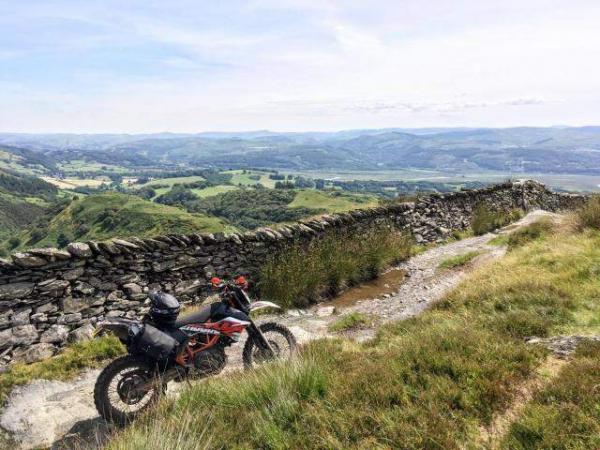
If you’ve ridden on a green lane - legally, I might add - you will at some point in time come across other trail users who take displeasure at having to share a lane with a powered two-wheeler.
It’s something I’ve experienced myself, and even when on a press outing with the Trail Riders Fellowship last year, I was berated by people who wrongly advised me that what I was doing was illegal and that they would call the police unless I stopped. I didn’t stop and as expected, the boys and girls in blue did not turn up.
And do you know what? I can handle that. We can’t expect a casual hiker, who is out for a stroll on a sunny day, to fully understand the complex laws and guidelines that go hand in hand with riding a motorcycle on a green road.
What does grind my gears, though, is when mainstream newspapers, The Guardian in this case, run partisan columns on such a complex subject. This column comes from Mr Mark Cocker, whose bio states he is an ‘author and naturalist, based in Derbyshire’.
The column recalls a particular hiking trip around the Three Shires Head in Derbyshire, which was inconvenienced by the “brutal revving of motorbikes”. The angle for much of the article is that it’s nature in the local area that is paying the price for all this.
One particular line, which recounts a conversation between Mr Cocker and one of the dirt bike riders, arguably fans the flames of controversy; and the smoke is all blowing the biker’s direction here. It reads: “‘You do your thing, mate, this is ours,’ was their [the riders] justification when confronted, as if it were a matter of individual liberty; as if each pedestrian or biker were an equal and thus free to find their own path to fulfilment in the Peak District.”
Now, it’s clear to highlight here that nothing in Mr Cocker’s report alludes to any illegal motorcycle activity, or that the riders were using paths that were under Traffic Regulation Orders (TROs) or indeed permanently closed to all motorised vehicles. And without that clarification from the writer, we’ll assume they were riding perfectly legitimately and within their rights. So this really is down to the - and I’ll quote Mr Cocker here - “individual liberty” of each person, and means that people are in fact “free to find their own path to fulfilment”.
The TRF also highlights that there are 140,000 miles of public rights of way on offer, 98 per cent of which are free from traffic. Objecting to a user group having access to less than two per cent to me suggests intolerance and privilege. The implication in the column is that other trail users should be placed above motorcycle riders when using the UK’s network of green roads. And while under the latest Highway Code rules, especially the section relating to the hierarchy of road users, we do have a responsibility to look out for road users more vulnerable than us, that doesn’t demote motorcyclists down the pecking order in terms of which roads we can access and when. No one user group has higher access entitlement over another.
Motorcycles are not the only form of noise pollution in the Peaks, or any of the UK’s national parks for that matter. Everything from fighter jets passing through the Mach Loop in Wales, to agriculture and construction work makes noise in the countryside. It’s an unavoidable aspect of human impact. Does Mr Cocker object to the regular fell running events that take place in the Peaks, bringing droves of competitors and supporters from across the country to the area? Or when one of the many downhill mountain biking races takes place on his beloved hillsides? With fans and families cheering riders on and blowing whistles and airhorns to warn of an incoming competitor?
Over 80 per cent of land in England is agricultural, and regularly managed with heavy plant and farming machinery. This use, and the noise associated with it, can often go on for long periods daily and yet the countryside is teaming with wildlife, fauna and flora. To then suggest that natural landscapes are shattered by the presence, and damaged irreversibly by a few motorcycles seems to ignore the wider picture.
There is also the impact on the Peak District that is done by all visitors, regardless of their pastime. The area pulls in an estimated 13 million visitors a year, and motorcycle riders using green lanes likely make up a tiny proportion of that number. In 2019, UK Hillwalking reported that 50 tonnes of general waste and 10 tonnes of recyclable waste were collected by the National Park each year. This also has a detrimental effect on flora and fauna, and the enjoyment of those visiting the area.
What I do think is that Mr Cocker won’t be happy until he’s pointed enough dislike at motorcycle riders who use green lanes that we eventually have that right stripped away from us. And that will be a very sad day indeed.
Jonathan from the TRF and Toad on a recent press outing
To get an official view on this (because in truth, what do I know?) we reached out to the Trial Riders Fellowship (TRF) to see what their Head of Communications, Jonathan Bentman, had to say.
“This article is typical of the ‘clickbait’ journalism we see in mainstream media these days, where personal opinion and prejudice overrule reason and fact. It employs the classic ‘bad news sells’ maxim. ‘Local area prospers from responsible and sustainable tourism’ or ‘Over-40s receive major health benefits from trail riding’ does not make for such a catchy headline. In the most part, the TRF has given up engaging with such media as the publishers have their agenda and will publish based on it.”
TRF CEO Graeme Collins goes on to say:
“The countryside should be a tolerant and inclusive place. To underline this, many countryside user groups such as The Ramblers, British Horse Society and Cycling UK – as well as the TRF – alongside nature and wildlife organisations, have recently become signatories to Outdoors of All. This is a manifesto which calls for increased public access to Green and Blue spaces from the current eight per cent of the countryside which is accessible to the public.”
The TRF acknowledges that motorcycle noise does divide opinion and that riders can make efforts to reduce their impact in a variety of ways, which the TRF explains in an article here.
We also reached out to the Peak District National Park Authority, which said:
“Off-road motorcycling, when undertaken legally, is just one of a huge number of ways the Peak District can be enjoyed and enable the boost to wellbeing offered by protected landscapes including our National Parks.
“However, it is important these activities are carefully balanced against the special qualities of our National Parks. Formal closures such as Traffic Regulation Orders (TROs) are in place to safeguard these valued places; especially where damage could result from such activities through sustained use.”
Motorcycle use on green roads is at risk, the rights of access were very nearly reduced last year, and we all have a responsibility to prevent that from happening. One of the best ways to do it is to utilise the network in a safe, considerate and law-abiding way. There is a flip side to this though, and that comes from educating other green lane and byways users on who is allowed to use the roads, and what the hierarchy is. Articles such as the one written by Mr Cocker and published in the Guardian feel as though they do the opposite of that.
We also reached out to the Guardian Online for comment although they did not respond - you can read the column here.
To hear more from Jon about what the TRF is and how it helps to maintain and improve the UK’s network of green roads, check out this article published last year.

